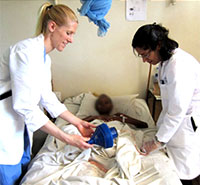"The world should be mad at me if I don't pursue this." [VIDEO]
-
-
slice.mit.edu
Filed Under

Before pursuing a doctorate at MIT, Danielle Zurovcik SM ’07, PhD ’12 had never designed or developed a medical device. But her exposure in Professor Alex Slocum’s Precision Engineering Research Group (PERG) led her to develop a simplified negative pressure wound therapy device (sNPWT) that would later become known as the Wound-Pump.
“I realized that I was passionate about medical devices. I liked the Wound-Pump because we were able to put it on patients faster than a technology that was highly invasive,” she said.
A negative pressure wound therapy device (NPWT) applies a vacuum dressing to the wound to drain fluid and increase blood flow. It also stresses the cells, which causes them to divide faster and accelerates the healing process. The NPWT currently on the market requires electricity to operate whereas Zurovcik’s sNPWT is entirely mechanical.
During her D-Lab Scale-Ups fellowship, the device was applied in the field after the earthquake in Haiti and during a study in Rwanda. After witnessing its successful application, Zurovcik realized that the device could solve an immediate and critical need.
Zurovcik is the founder and CEO of WiCare (Worldwide Innovative Healthcare Inc.), a company that develops effective and inexpensive medical devices. WiCare’s goal is to make high-quality healthcare available to remote or impoverished areas of the world. The Wound-Pump is the company’s first product.
A NPWT currently on the market has been proven to quickly and effectively heal chronic wounds but the high cost and electricity requirements limit its use. Zurovcik’s Wound-Pump requires no electricity to operate and costs less than $3 to make.
While starting a company isn’t an easy task, Zurovcik draws inspiration and motivation from the many patients that the Wound-Pump has already helped.
“Whenever you’re working all hours of the night and you’re like, ‘what am I doing this for?’ You have to think of those small cases that are making you move forward,” she said.
For aspiring entrepreneurs she offers this one piece of advice:
“Be true to yourself,” she said. “Because you’re going to have to put a lot of time into it so you should put a lot of time into what you’re comfortable with and what you love.”







